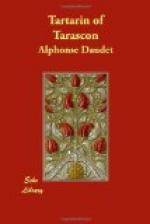So was the legislature on Tartarin’s side. Two or three times, in open court, the old chief judge, Ladevese, had said, in alluding to him:
“He is a character!”
Lastly, the masses were for Tartarin. He had become the swell bruiser, the aristocratic pugilist, the crack bully of the local Corinthians for the Tarasconers, from his build, bearing, style — that aspect of a guard’s-trumpeter’s charger which fears no noise; his reputation as a hero coming from nobody knew whence or for what, and some scramblings for coppers and a few kicks to the little ragamuffins basking at his doorway.
Along the waterside, when Tartarin came home from hunting on Sunday evenings, with his cap on the muzzle of his gun, and his fustian shooting-jacket belted in tightly, the sturdy river-lightermen would respectfully bob, and blinking towards the huge biceps swelling out his arms, would mutter among one another in admiration:
“Now, there’s a powerful chap if you like! he has double-muscles!”
“Double muscles!” why, you never heard of such a thing outside of Tarascon!
For all this, with all his numberless parts, double-muscles, the popular favour, and the so precious esteem of brave Commandant Bravida, ex-captain (in the Army Clothing Factory), Tartarin was not happy: this life in a petty town weighed upon him and suffocated him.
The great man of Tarascon was bored in Tarascon.
The fact is, for a heroic temperament like his, a wild adventurous spirit which dreamt of nothing but battles, races across the pampas, mighty battues, desert sands, blizzards and typhoons, it was not enough to go out every Sunday to pop at a cap, and the rest of the time to ladle out casting-votes at the gunmaker’s. Poor dear great man! If this existence were only prolonged, there would be sufficient tedium in it to kill him with consumption.
In vain did he surround himself with baobabs and other African trees, to widen his horizon, and some little to forget his club and the market-place; in vain did he pile weapon upon weapon, and Malay kreese upon Malay kreese; in vain did he cram with romances, endeavouring like the immortal Don Quixote to wrench himself by the vigour of his fancy out of the talons of pitiless reality. Alas! all that he did to appease his thirst for deeds of daring only helped to augment it. The sight of all the murderous implements kept him in a perpetual stew of wrath and exaltation. His revolvers, repeating rifles, and ducking-guns shouted “Battle! battle!” out of their mouths. Through the twigs of his baobab, the tempest of great voyages and journeys soughed and blew bad advice. To finish him came Gustave Aimard, Mayne Reid, and Fenimore Cooper.
Oh, how many times did Tartarin with a howl spring up on the sultry summer afternoons, when he was reading alone amidst his blades, points, and edges; how many times did he dash down his book and rush to the wall to unhook a deadly arm! The poor man forgot he was at home in Tarascon, in his underclothes, and with a handkerchief round his head. He would translate his readings into action, and, goading himself with his own voice, shout out whilst swinging a battle-axe or tomahawk:




